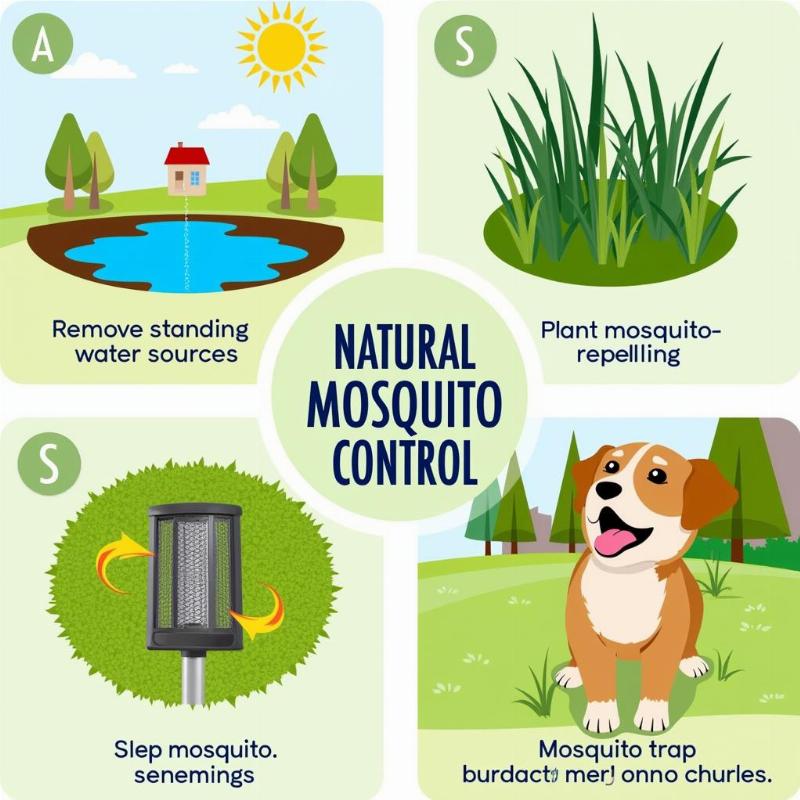Keeping your backyard a mosquito-free haven for both you and your furry friend is a top priority, especially during those warm summer months. Finding the right mosquito spray for yard safe for dogs can be a challenge, but with a little research and careful consideration, you can create a pest-free paradise that’s safe for everyone. This article will guide you through selecting and using effective and dog-friendly mosquito control solutions for your yard.
Choosing the Right Mosquito Spray for Your Dog-Friendly Yard
There are a plethora of mosquito sprays on the market, but not all are created equal when it comes to canine safety. Prioritize products specifically labeled as safe for pets and children. Look for sprays with natural ingredients like citronella, lemongrass, or geranium oil, which are known for their mosquito-repelling properties. Avoid products containing DEET or permethrin, as these chemicals can be toxic to dogs.
Always read the label carefully before purchasing and applying any mosquito spray. Follow the manufacturer’s instructions precisely to ensure both effectiveness and safety. If you have any doubts about a product’s safety, consult your veterinarian. They can offer recommendations tailored to your dog’s specific needs and health conditions.
Natural Mosquito Control Methods
Beyond commercial sprays, several natural methods can help reduce mosquito populations in your yard. Standing water is a breeding ground for mosquitoes, so eliminate any sources you can find. This includes emptying bird baths, flower pot saucers, and any containers that collect rainwater.
 Natural Mosquito Control Methods
Natural Mosquito Control Methods
Planting mosquito-repelling plants like citronella, lavender, and marigolds can also contribute to a less mosquito-friendly environment. These plants release fragrances that naturally deter mosquitoes. Consider adding a bat house to your yard. Bats are natural predators of mosquitoes and can significantly reduce their numbers.
Protecting Your Dog from Mosquito Bites
While creating a mosquito-free yard is the goal, providing additional protection for your dog is crucial. Consider using a dog-specific mosquito repellent. These are available in various forms, including sprays, collars, and wipes. Again, choose products with natural ingredients and avoid those containing harmful chemicals.
Keep your dog indoors during peak mosquito hours, typically dawn and dusk. Provide a comfortable and mosquito-free indoor space where they can relax and avoid being bitten. Regularly check your dog for ticks and mosquitoes after they’ve been outdoors. Prompt removal can prevent the transmission of diseases.
Frequently Asked Questions (FAQ)
-
What are the signs of mosquito bite allergies in dogs? Swelling, redness, itching, and hives at the bite site are common signs. In severe cases, difficulty breathing or facial swelling can occur.
-
Can I use human mosquito repellent on my dog? No, human mosquito repellents often contain DEET, which is toxic to dogs. Always use a dog-specific repellent.
-
What diseases can mosquitoes transmit to dogs? Heartworm disease is the most serious mosquito-borne illness in dogs.
-
How often should I apply mosquito repellent to my yard? Follow the product label instructions for frequency of application.
-
Are mosquito dunks safe for dogs? Mosquito dunks, containing Bacillus thuringiensis israelensis (Bti), are generally considered safe for dogs.
-
What is the most effective way to prevent heartworm disease in dogs? Monthly heartworm preventatives prescribed by your veterinarian are the most effective protection.
-
Are there any home remedies for mosquito bites on dogs? Applying a paste of baking soda and water can help soothe itching.
Conclusion
Creating a mosquito-free yard that’s safe for your dog requires a multi-pronged approach. Choosing the right mosquito spray, incorporating natural control methods, and providing your dog with additional protection are all essential steps. By taking these precautions, you can ensure that both you and your furry companion can enjoy the outdoors without the nuisance and potential health risks of mosquitoes. Remember to always consult your veterinarian if you have any concerns about your dog’s health or the safety of any pest control products.
Related Articles
vets best mosquito repellent for dogs
Beautdogs.us is your trusted source for comprehensive dog care, breed information, and product recommendations. We offer expert advice for both novice and experienced dog owners alike. We are dedicated to helping you provide the best possible care for your beloved canine companion. Contact us today to learn more about our services! Email: [email protected], Phone: +1 501-555-7529. Visit Beautdogs.us for more expert tips and information.